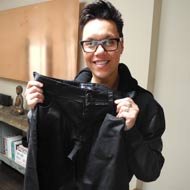
PDSA launches Vet Your Clothes campaign to boost stock
Over 50 per cent of people in Britain are hoarding clothes they don't wear, while stock donations to PDSA charity shops has fallen by 13 per cent, according to new research.
An online survey commissioned by the veterinary charity found 56 per cent of people over the age of 16 are holding on to items that could be worth millions to charity, despite the fact they don't fit, don't suit them or were a fashion fad.
The poll also found more than 25 per cent of people to take part were throwing their unwanted clothes in the bin rather than donating them.
Meanwhile, donations to PDSA's shops has fallen by more than 10 per cent in the past four years.
"This is leaving us short of the goods to sell in our shops, which means less money to fund our Pet Hospitals,” said Philip Klette, the charity's head of retail.
"Many charities have noticed a decline in donated stock levels over the past few years but people might not realise that, just by clearing out a few unworn items, you could make a massive difference to PDSA."
In a bid to try to boost its stock donations, the charity is launching a Vet Your Clothes campaign, which has already won support from celebrities including fashion guru Gok Wan and comedian Russell Kane.
Gok has donated a pair of Jean Paul Gautier jeans he wore on Comic Relief The Apprentice. He said: "If you haven’t worn something in the past year, the likelihood is that you never will, so please do something amazing and support PDSA.
"As a dog owner myself, I know just how much pets mean to people so please do what you can to help PDSA treat sick and injured pets."
PDSA is encouraging people to donate unwanted items to their nearest shop or Pet Hut store, and show their support on social media using #vetyourclothes.
Image courtesy of PDSA



 The Veterinary Medicines Directorate (VMD) is inviting applications from veterinary students to attend a one-week extramural studies (EMS) placement in July 2026.
The Veterinary Medicines Directorate (VMD) is inviting applications from veterinary students to attend a one-week extramural studies (EMS) placement in July 2026.